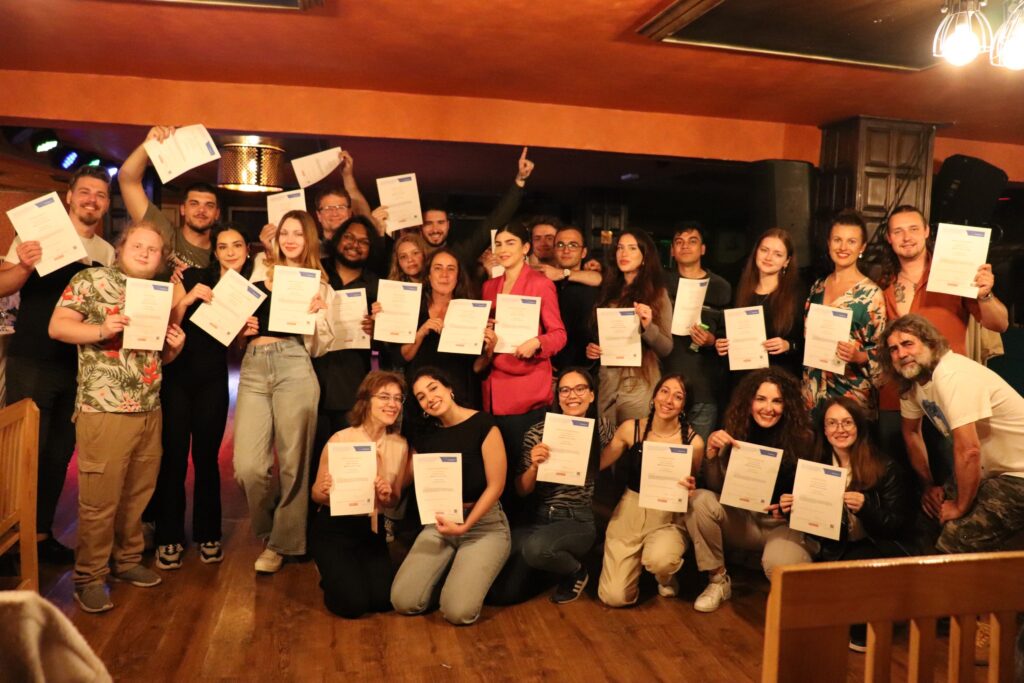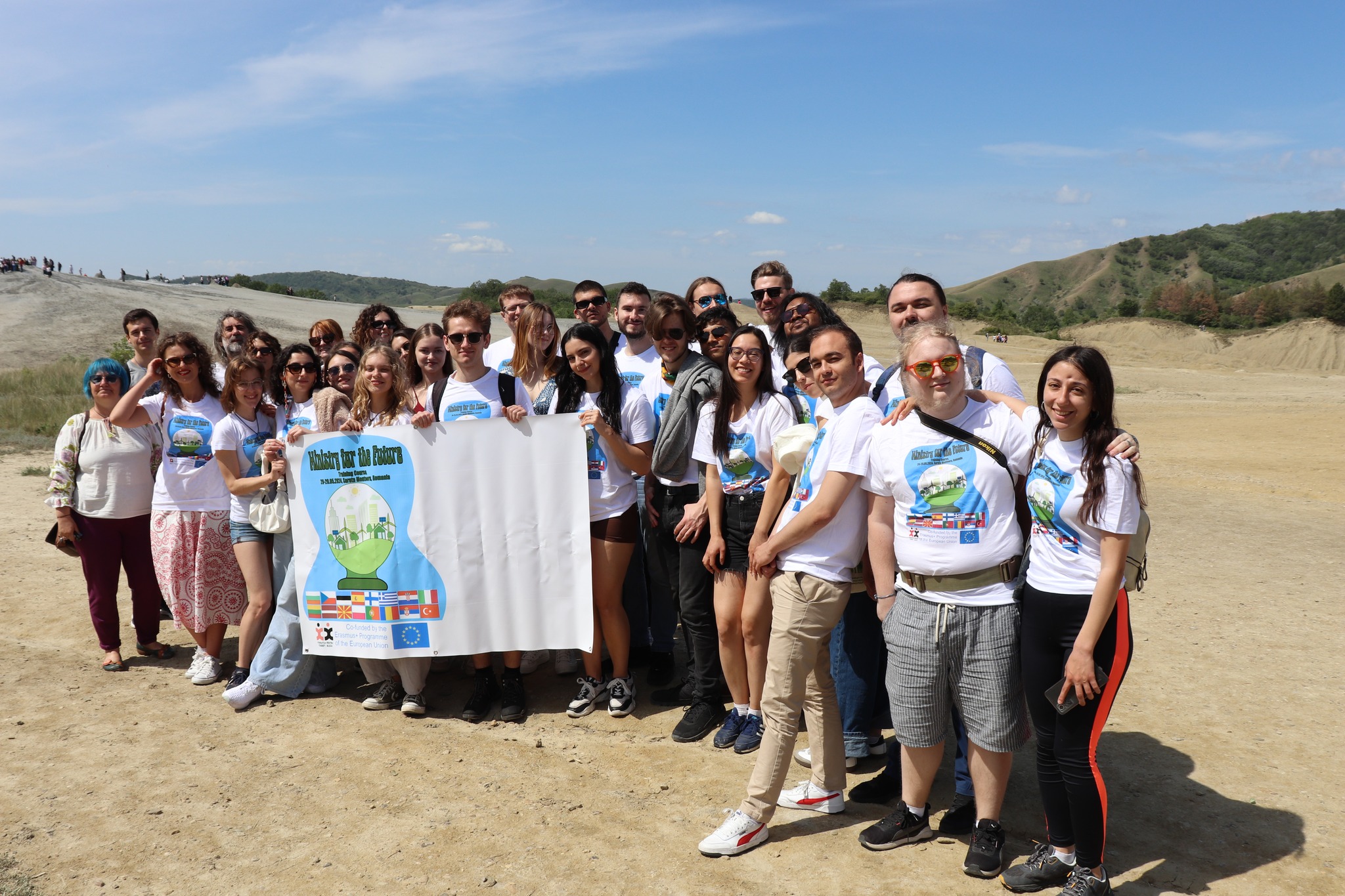“Ministry for the future” – a powerful title of the training course I recently attended, which was held in Sarata Monteoru and Buzău, Romania in the period from 20-29.5.2024. Can we, participants, really be the key link in shaping a future the way we would like it, the way it should be? I would say yes, it is seemingly “ordinary” people, participants, each different, special, that can be the basis of change. I will explain in more details why I think that way, but let’s start from the beginning…
The organizers, Fundatia Pentru Tineret Buzău, from Romania, invited more than 30 participants from 16 different countries to actively spend 10 days in the beautiful Sarata Monteoru, known for its healing salt water, where we will work out the circular economy from various aspects. The goal was through all those activities and workshops to acquire new methods with which we will be able to develop the circular economy as a tool for promoting sustainable development. Activities ranged from energizers for good morning, to games for getting to know each other, for gaining confidence and building team spirit, creative workshops where our creativity was put to the test from art in nature to designing clothes, decorations from already used things declared as waste. We even had opportunities to try ourselves in the roles of singers, actors, dancers, writers of stories and songs, ministers, time travelers and many other unusual, but very cleverly designed roles and activities. We created beautiful and ugly things, contrasts that perfectly capture the situation in which we all find ourselves. Excessive consumption, non-recycling, lack of care, so-called passive and uninterested living in terms of caring for the environment, can cost us very dearly, and at the same time, all that beauty that we all desire and enjoy overnight can turn into the ugliness that we created during this training course, representing the dystopia that awaits us if we do not take something drastic. But I believe that we can deal with the situation, we have the capacity, but also desire that will come to the fore more and more.
Even the very beginning promised a lot, presenting ourselves through caricatures drawn by people we meet for the first time, capturing ourselves through a single object… For me, the choice of objects that the other participants decided to bring to represent themselves was particularly interesting. There was literally everything, from childhood toys, to lipstick, sunflowers, empty space, a watch, a dress, a picture, a pendant, a scarf… even at that moment I realized that a colorful adventure awaits us, full of novelties, diversity and creativity. And so it was, precisely that diversity of characters, views, backgrounds contributed to the success of the project in terms of finding different solutions for the tasks and challenges set for the topic, but also in general for our personal enrichment and broadening of horizons.
In the direction of personal enrichment, the international or intergalactic dinners (as we called them internally) definitely contributed, which, as always, are one of the most special moments. Of course, the diversity, the characteristics of the individual participants, representatives of a certain country, and culture are noticeable and we enjoy them during the entire duration of the projects. Because for the duration of the training course we live and work together, surrounded by those differences. But for me the most beautiful moment is when from all that mix of different cultures, habits, backgrounds always emerges a synergy and a positive feeling and an experience that is remembered with pleasure. These evenings provide an opportunity to more directly emphasize certain symbols, recognizable things, moments or elements that the representatives of a certain country will decide to highlight for their country, and which will be remembered by the rest of the participants as a symbol or feature of a certain country or people. At those evenings, in addition to numerous dances and songs, we also learned a few words in Polish, we heard a live musical performance in Lithuanian, we confirmed that sarma is the main dish in the entire Balkans and you can’t do without rakija, we got acquainted with the “chili” amulet from Italy, we predicted the future with Turkish coffee while eating Turkish delight, Estonian chocolates and snacks, Spanish appetizers, while my grandmother’s ajvar conquered everyone from Portugal, Spain, to Latvia, Finland and Turkey.
Among the favorite activities of all participants, were the outdoor activities, including the visit to the Muddy Volcanoes, a UNESCO heritage site. In doing so, we were lucky to hit a not so active day, that is, the surface around the volcanoes was dry enough, to be able to get close and see the active muddy volcanoes up close. I must admit it was really unusual and interesting to see. In addition to being protected and recognized by UNESCO, it is interesting to observe, but it is also a good place to take very interesting photos, which is confirmed by the fact that many movie scenes have been shot right there. The next activity was a visit to the slow food market – an event that is held at least once a month and where all the local products are presented and sold to visitors, from cured meats, cheeses, wine, beer to jewelry and clothes, accompanied by Romanian music for an even more beautiful atmosphere. Real enjoyment and great hanging out. As a matter of fact, I really liked the whole concept of slow food, although as a term and concept it was superficially familiar to me from before. But as we researched the happenings in our cities, I must admit that I was positively surprised by how much Skopje, but also Macedonia in general, has to offer in that section. I mean from the point of view of organizations, communities, we even had a whole elaborate platform, which, unfortunately, a large part of us do not know about (including me). From there, we have to work on visibility. It’s a pity when something good is done, it goes unnoticed and is enjoyed by only a few people. So, dear people, when you do something good, please praise yourself, and let the rest of us take more interest, contribute as much as we can, or at the very least, research a little more about the happenings around us.
In the context of the main topic of the training course – circular economy in the direction of sustainable development, an excellent example in practice was the stay in Buzau and the visit to the Margiloman Park and Villa Albatros as the cultural center of Buzau. There we had a very interesting meeting with Anka, an expert in circular economy and one of the four city councilors in that domain. From a seemingly ordinary city, through the conversation with Anka, we got to know a different city of Buzau, a city that is completely oriented towards sustainability and where the circular economy is a priority and everyone actively works together to achieve that goal – Buzau, the circular city. In that part, the most special moment for me was the self-sustaining school no. 11, the so-called Circular School which is completely independent and self-sustaining. It is heated by solar energy, it collects rain that is further used as technical water and a number of other things that really amazed me and without a doubt the world needs many more schools no. 11.
The listed examples from practice, but also the many others that were discussed and shared within the group of participants are just another confirmation that anything can be achieved, if we really dedicate ourselves and activate. Even in a seemingly ordinary exercise, when we were appointed to the position of six ministries that will lead the world and make it a better place, within three days of active work, we participants, amateurs in the field of governance and overcoming key problems came to precisely defined problems, needs for which we found very interesting and practical solutions… Which only leads me to the conclusion that nothing is impossible if approached correctly. If the big picture is perceived, the key problems and priorities are isolated and we jointly commit to overcoming, preventing and creating a better future and a sustainable planet that we will all enjoy. We will not overcome the problems of excessive consumption, the harmful impact of our actions, nor will we be able to move from a linear to a circular economy, if each and every one of us does not perceive the importance and necessity of the same. Hence the introduction that I believe that each individual has the power to make a change and only with a multitude of individual actions can we change and beautify the big picture.
Maja Martinovska


